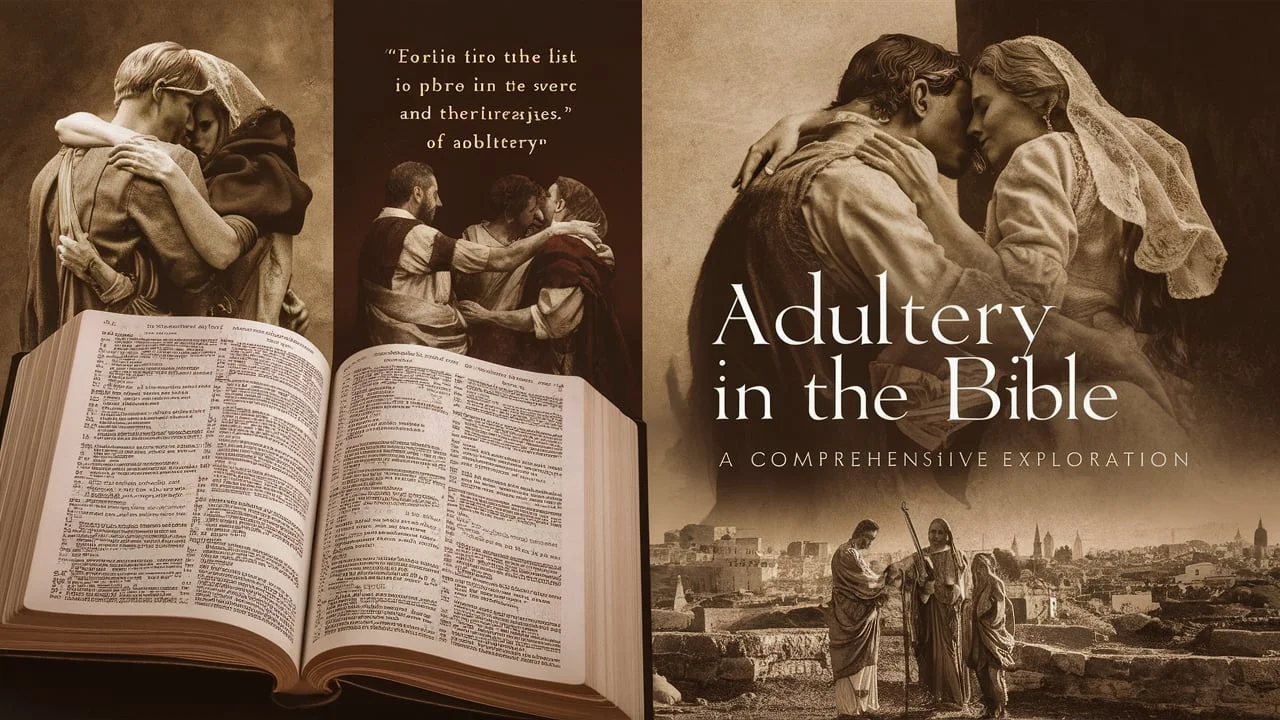Last Updated on September 24, 2024 by Muhammad Ramzan
Understanding adultery in the Bible involves delving into its definitions, historical teachings, consequences, and modern implications.
This comprehensive guide will explore the concept of adultery through various biblical lenses, providing a detailed examination of its significance and application.
Biblical Definition of Adultery
Adultery is a serious transgression in the Bible, defined primarily as the act of engaging in sexual relations with someone who is not your spouse. In biblical terms, adultery is considered a grave sin, reflecting a breach of marital faithfulness.
Definition and Context
Adultery in the Bible is often linked to the violation of the marriage covenant. The term “adultery” in Hebrew is na’aph (נָאַף), which means “to commit adultery” or “to be unfaithful.” In Greek, the term is moicheia (μοιχεία), similarly referring to marital infidelity. Both terms underscore the betrayal of the marital relationship.
The distinction between adultery and fornication is significant. While adultery specifically involves a married person being unfaithful, fornication generally refers to sexual relations outside of marriage. This distinction helps clarify the moral and legal implications within biblical texts.
Old Testament Teachings
The Ten Commandments
One of the most direct references to adultery appears in the Ten Commandments. Exodus 20:14 states, “You shall not commit adultery.” This commandment establishes adultery as a fundamental moral violation, emphasizing the sanctity of marriage.
Law of Moses
The Mosaic Law provides further elaboration on the consequences of adultery. Deuteronomy 22:22 prescribes death for both parties involved in adultery. This stringent punishment reflects the serious nature of the offense in ancient Israelite society.
Key Aspects of Mosaic Law on Adultery
- Adultery and Incest: Laws in Leviticus 18 and 20 address adultery in the context of prohibited sexual relationships, including incest.
- Proof and Punishment: The law required evidence and witnesses to substantiate accusations of adultery, aiming to prevent false accusations.
Prophetic Warnings
Prophets often used adultery metaphorically to describe Israel’s unfaithfulness to God. For example:
- Hosea: The prophet Hosea’s marriage to Gomer symbolizes Israel’s spiritual infidelity.
- Jeremiah: Jeremiah condemns Israel’s “adultery” with foreign gods, highlighting the covenantal betrayal of the nation.
New Testament Perspectives
Teachings of Jesus
Jesus expands the definition of adultery in the New Testament, emphasizing not just physical acts but also lustful thoughts.
Key Passages
- Matthew 5:27-28: Jesus teaches that even looking at someone with lustful intent constitutes adultery of the heart.
- John 8:1-11: The story of the woman caught in adultery showcases Jesus’ approach to sin and forgiveness, emphasizing compassion and the call to “sin no more.”
Pauline Epistles
Paul’s letters provide significant teachings on adultery and sexual immorality.
Key Passages
- 1 Corinthians 6:9-10: Paul lists adulterers among those who will not inherit the kingdom of God, underscoring the gravity of the sin.
- Galatians 5:19-21: Adultery is included in the “acts of the flesh,” contrasting it with the fruit of the Spirit.
General Epistles
The General Epistles address adultery within the broader context of Christian ethics.
Key Passages
- James 4:4: James describes friendship with the world as spiritual adultery, further linking adultery with unfaithfulness to God.
- 1 Peter 2:11: Peter urges believers to abstain from sinful desires, which include adultery.
Consequences of Adultery in the Bible
Consequences in the Old Testament
In ancient Israel, the consequences of adultery were severe.
Social and Legal Repercussions
- Death Penalty: Under Mosaic Law, both parties involved in adultery faced capital punishment (Deuteronomy 22:22).
- Social Stigma: Adultery brought significant shame and social consequences, impacting the reputation and status of those involved.
Consequences in the New Testament
The New Testament focuses more on spiritual and communal repercussions rather than legal penalties.
Spiritual and Communal Repercussions
- Separation from God: Adultery is seen as a serious sin that separates individuals from God (1 Corinthians 6:9-10).
- Church Discipline: Early Christian communities practiced church discipline to address serious sins, including adultery (1 Corinthians 5:1-5).
Repentance and Forgiveness
Forgiveness and Redemption
The Bible offers pathways to forgiveness and redemption for those who commit adultery.
Biblical Process for Seeking Forgiveness
- Confession and Repentance: Genuine repentance involves acknowledging the sin and seeking forgiveness (1 John 1:9).
- Restoration: Jesus and Paul both emphasize that repentance leads to spiritual restoration and reconciliation with God (2 Corinthians 7:10).
Old Testament Examples
- David and Bathsheba: King David’s adultery with Bathsheba and subsequent repentance (Psalm 51) illustrates the possibility of forgiveness and restoration.
New Testament Examples
- The Woman Caught in Adultery: Jesus’ interaction with the woman caught in adultery demonstrates compassion and the offer of forgiveness (John 8:1-11).
Adultery and the Christian Church
Historical Perspectives
The early church addressed adultery with a combination of moral teaching and church discipline.
How the Early Church Handled Adultery
- Church Discipline: The early church practiced excommunication for serious sins, including adultery (1 Corinthians 5:1-5).
- Forgiveness and Restoration: Despite severe discipline, the goal was always to restore the sinner to the faith.
Modern Application
Contemporary Christian practices regarding adultery vary but generally emphasize reconciliation and counseling.
Contemporary Church Views and Practices
- Counseling and Support: Many churches offer counseling services to help individuals and couples affected by adultery.
- Reconciliation and Forgiveness: Modern Christian teachings stress the importance of forgiveness and working towards reconciliation within marriages.
Cultural and Historical Context
Historical Practices and Beliefs
Adultery was viewed with high seriousness in ancient cultures, including those surrounding biblical Israel.
Cultural Influence on Biblical Interpretation
- Ancient Near Eastern Laws: Similar to biblical laws, other ancient cultures also had strict regulations against adultery, influencing the biblical texts.
- Biblical Context: Understanding the historical and cultural backdrop helps in interpreting the biblical texts accurately.
Frequently Asked Questions
What is the biblical definition of adultery?
The biblical definition of adultery involves a married person engaging in sexual relations with someone other than their spouse.
How does the Bible differentiate between fornication and adultery?
Adultery refers to infidelity within marriage, while fornication generally refers to sexual relations outside of marriage.
Examples where adultery is addressed in biblical scripture?
Notable examples include the Ten Commandments (Exodus 20:14), the story of David and Bathsheba (2 Samuel 11), and Jesus’ teachings (Matthew 5:27-28).
What are the consequences for adultery according to biblical teachings?
Consequences range from legal penalties in the Old Testament (Deuteronomy 22:22) to spiritual and communal repercussions in the New Testament (1 Corinthians 6:9-10).
How does the Bible address the issue of adultery in the context of marriage and divorce?
The Bible upholds the sanctity of marriage and views adultery as a serious breach, often justifying divorce in such cases (Matthew 5:32).
What did Jesus teach about the act of adultery?
Jesus taught that adultery includes not just physical acts but also lustful thoughts, emphasizing a higher standard of purity (Matthew 5:27-28).
Conclusion
The biblical teachings on adultery offer a profound understanding of its moral, social, and spiritual implications. From Old Testament laws to New Testament teachings, the Bible consistently addresses adultery as a serious sin with significant consequences. However, it also offers pathways for repentance and forgiveness, highlighting the possibility of redemption and restoration.

Nicholas Clark is a seasoned dream interpreter with a deep understanding of biblical symbolism. With over a decade of experience, Nicholas unravels the mysteries of dreams, offering profound insights and spiritual guidance to those seeking divine wisdom.










